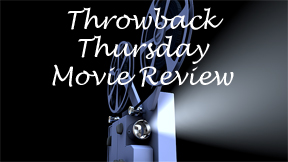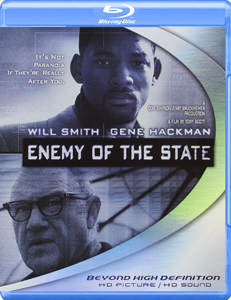“Enemy of the State” (1998) is a link from the Seventies to the Nineties to today as it illustrates spy-state apparatuses at the point of no return. It’s a spiritual sequel to “The Conversation” (1974) – unfortunately missing out on a chance to be a direct sequel – but in a different genre, as it swaps out slow-burn paranoia for Will Smithian action.
There are few things that say “Nineties” more than satellite dishes moving through space, beeping and ticking for the apparent sole purpose of tracking an action hero. Lawyer Robert Clayton Dean (Smith) runs from feds under the command of corrupt NSA director Thomas Bryan Reynolds (Jon Voight).
Director Tony Scott’s action-thriller is a veritable Christmas celebration from the age of buzzworthy big-budgeters. It’s like a few stars and handfuls of character actors (including Jason Lee, Jack Black, Seth Green and Jamie Kennedy in “geek” roles as techies) gather for a grand party as the Jerry Bruckheimer production machine shoots out cash like confetti.

“Enemy of the State” (1998)
Director: Tony Scott
Writer: David Marconi
Stars: Will Smith, Gene Hackman, Jon Voight
Making a Smith actioner was like printing money in 1998, and certainly the star brings his charm, finding a middle ground between action hero and slightly awkward family man – see the lingerie-store scene and Dean’s obsession with his stolen blender.
Caught on tape; caught with the tape
Writer David Marconi (“Live Free or Die Hard”) does the best work of his career with a complex-but-followable plot. Reynolds is unknowingly caught on a nature-preserve video killing a Congressman in order to clear the way for a national security bill that will legalize more domestic spying (ah, such innocent times, when such a bill was debated in the news cycle!). Randomly and unknowingly, Dean acquires the tape.
The opening act is goofy fun in that Bruckheimerian way, as the tech geeks instantaneously have eyes and ears on Dean. Plus we get that fake-tech nugget wherein a techie can take random video footage and zoom and enhance and extrapolate other angles. Some of this is real now, but it’s unlikely that it’s a process that takes mere seconds.
With its scary tech undercut by silly exaggerations, “Enemy of the State” continues from “The Conversation” and makes us sigh and think “Nineties movies are a lot dumber than Seventies movies.” But then Gene Hackman enters to begin the second act as the much name-dropped Edward Lyle Brill.
As we learn details about Brill in peppered exposition, it’s clear he is not Harry Caul from “The Conversation.” Harry works in the private sector, and we learn Brill’s entire career was in government before he became persona-non-grata for political reasons.
But the homage is clear. The glasses-wearing Hackman has a similar vibe to Caul, like he’s become even more cynical. The expert bugger’s loner status – for the sake of not having loved ones who can get killed – remains. Brill’s office space is patterned after Caul’s – a wire-mesh space inside a larger disused warehouse. And a key spying sequence in a city square is directly patterned after the centerpiece sequence from “The Conversation,” more jittery in its pacing and easier in its technological magic.

Shooting till the end … in both senses of the word
“Enemy of the State” could coast to an ending of grand action, but Marconi comes up with a great twist. Dean, having done many stupid (but understandable for a commoner) things like making a pay-phone call that can be tracked, devises an ingenious last-ditch effort based on two distinct villains’ separate understandings of what “the videotape” refers to. As far as Bruckheimerian bloodbath shootouts go, this one outstrips “The Rock’s” because of the climactic stakes.
The ongoing conversations about the balance between national security and personal privacy (a wild imbalance in the real world by then, and more so now) are not revelatory, but the film would make a smart entry for a young person just learning about the issue.
I like Marconi’s idea that Dean’s wife (Regina King) is the one who grasps the paradox of the spy state (“Well, who’s gonna monitor the monitors of the monitors?”) whereas Dean – despite being a lawyer! – isn’t interested in the immorality of laws until he’s in the crosshairs. And we get some good, chilling lines, such as Reynolds’ “The only privacy that’s left is the inside of your head. Maybe that’s enough.”
The security-privacy balance was never achieved in the USA, and sadly we’ll never get back there, but “Enemy of the State” achieves an intellectual-entertainment balance. Come for the car chases, explosions and menacing satellite dishes; stay for the conversation about government spying. Or vice versa.

